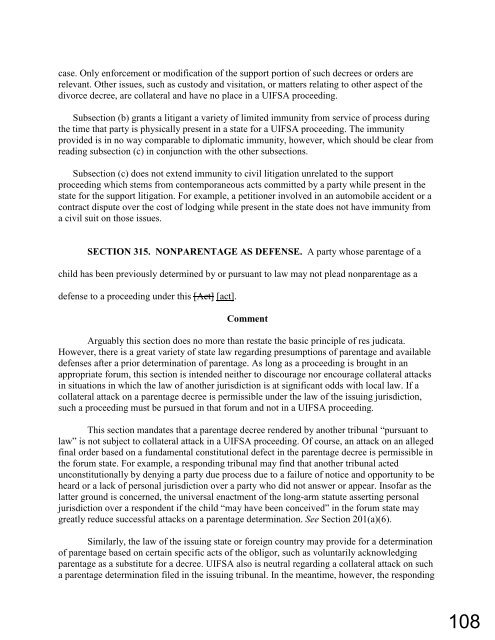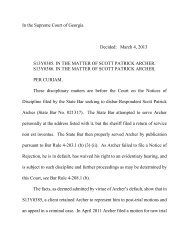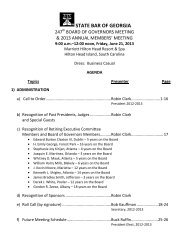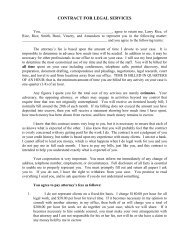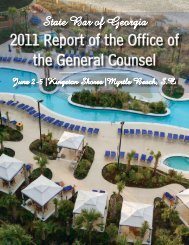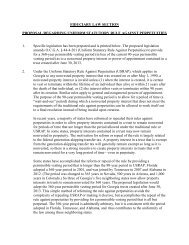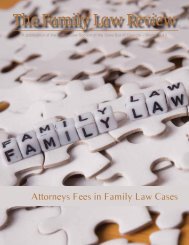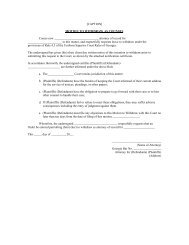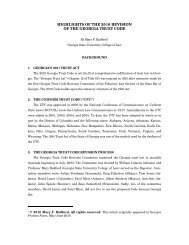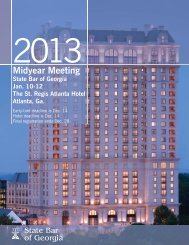2008 Amendments to the Uniform Interstate Family Support Act ...
2008 Amendments to the Uniform Interstate Family Support Act ...
2008 Amendments to the Uniform Interstate Family Support Act ...
Create successful ePaper yourself
Turn your PDF publications into a flip-book with our unique Google optimized e-Paper software.
case. Only enforcement or modification of <strong>the</strong> support portion of such decrees or orders are<br />
relevant. O<strong>the</strong>r issues, such as cus<strong>to</strong>dy and visitation, or matters relating <strong>to</strong> o<strong>the</strong>r aspect of <strong>the</strong><br />
divorce decree, are collateral and have no place in a UIFSA proceeding.<br />
Subsection (b) grants a litigant a variety of limited immunity from service of process during<br />
<strong>the</strong> time that party is physically present in a state for a UIFSA proceeding. The immunity<br />
provided is in no way comparable <strong>to</strong> diplomatic immunity, however, which should be clear from<br />
reading subsection (c) in conjunction with <strong>the</strong> o<strong>the</strong>r subsections.<br />
Subsection (c) does not extend immunity <strong>to</strong> civil litigation unrelated <strong>to</strong> <strong>the</strong> support<br />
proceeding which stems from contemporaneous acts committed by a party while present in <strong>the</strong><br />
state for <strong>the</strong> support litigation. For example, a petitioner involved in an au<strong>to</strong>mobile accident or a<br />
contract dispute over <strong>the</strong> cost of lodging while present in <strong>the</strong> state does not have immunity from<br />
a civil suit on those issues.<br />
SECTION 315. NONPARENTAGE AS DEFENSE. A party whose parentage of a<br />
child has been previously determined by or pursuant <strong>to</strong> law may not plead nonparentage as a<br />
defense <strong>to</strong> a proceeding under this [<strong>Act</strong>] [act].<br />
Comment<br />
Arguably this section does no more than restate <strong>the</strong> basic principle of res judicata.<br />
However, <strong>the</strong>re is a great variety of state law regarding presumptions of parentage and available<br />
defenses after a prior determination of parentage. As long as a proceeding is brought in an<br />
appropriate forum, this section is intended nei<strong>the</strong>r <strong>to</strong> discourage nor encourage collateral attacks<br />
in situations in which <strong>the</strong> law of ano<strong>the</strong>r jurisdiction is at significant odds with local law. If a<br />
collateral attack on a parentage decree is permissible under <strong>the</strong> law of <strong>the</strong> issuing jurisdiction,<br />
such a proceeding must be pursued in that forum and not in a UIFSA proceeding.<br />
This section mandates that a parentage decree rendered by ano<strong>the</strong>r tribunal “pursuant <strong>to</strong><br />
law” is not subject <strong>to</strong> collateral attack in a UIFSA proceeding. Of course, an attack on an alleged<br />
final order based on a fundamental constitutional defect in <strong>the</strong> parentage decree is permissible in<br />
<strong>the</strong> forum state. For example, a responding tribunal may find that ano<strong>the</strong>r tribunal acted<br />
unconstitutionally by denying a party due process due <strong>to</strong> a failure of notice and opportunity <strong>to</strong> be<br />
heard or a lack of personal jurisdiction over a party who did not answer or appear. Insofar as <strong>the</strong><br />
latter ground is concerned, <strong>the</strong> universal enactment of <strong>the</strong> long-arm statute asserting personal<br />
jurisdiction over a respondent if <strong>the</strong> child “may have been conceived” in <strong>the</strong> forum state may<br />
greatly reduce successful attacks on a parentage determination. See Section 201(a)(6).<br />
Similarly, <strong>the</strong> law of <strong>the</strong> issuing state or foreign country may provide for a determination<br />
of parentage based on certain specific acts of <strong>the</strong> obligor, such as voluntarily acknowledging<br />
parentage as a substitute for a decree. UIFSA also is neutral regarding a collateral attack on such<br />
a parentage determination filed in <strong>the</strong> issuing tribunal. In <strong>the</strong> meantime, however, <strong>the</strong> responding<br />
108


